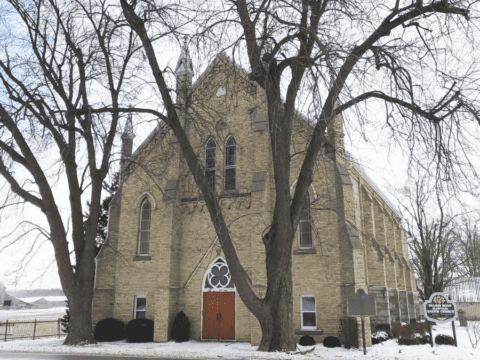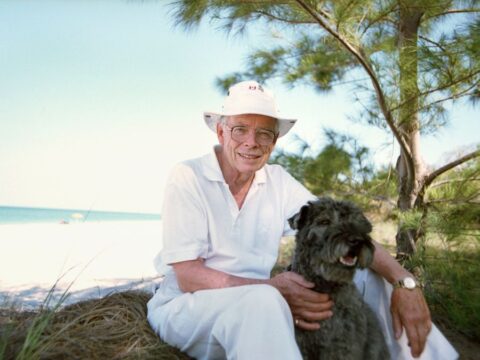It was Christmas Eve, and I was getting ready for worship in a typical United church. You know: stained glass, dark wood, colourful wall hanging and a crèche, mingled in with Christmas lights, evergreens and a whole lot of baubles and glitter.
There was also a load of people. The regulars mixed with the visitors, with many of the empty spaces filled in by the “doin’ it for Grandma” folks. Looking out at the latter, I realized I wasn’t particularly worried about why they were here, but I hoped, in the few minutes we had with them, that a bit — even just a tiny bit — of the wonder, awe and love of the Christ moment would touch them.
You may unsubscribe from any of our newsletters at any time.
“Maybe,” I thought. “Maybe this year, just for one second, someone in the congregation will get a glimpse of miracle.” Maybe I would.
Who was I trying to kid? This year was going to be like all the others: Sing some carols. Read the scriptures. Smile. Nod. Shake people’s hands and wish them a blessed Christmas, and wait for folks to start showing up for the late service. Communities of Christ’s people have been gathering for over 2,000 years to tell the story of Jesus’ birth, sharing how he lived and died and was resurrected. Why would I ever think I could bring something new to that?
You might be able to tell that I was tired. In many ways, the entire congregation was tired. It was one of those years when we weren’t quite sure if we’d make it through with the bank account on the positive side. There had been a number of deaths among the stalwarts of the congregation, people who had helped us define ourselves and understand what our ministry is about. We weren’t sure what the next year was going to bring, and to be honest, we were a bit scared.
It was just about time to begin the service. After a deep breath, I said, “Good evening. A warm welcome to each and every one of you, in the name of Jesus Christ. Take a moment to look around you. Do you see someone you don’t recognize? Perhaps someone who is back with us from school or who is visiting family tonight? Maybe —”
That’s when I heard them. Jingling bells. Then came the crack of a whip, snapping in the air. The thud of hooves moved across a snow-packed surface. And all of it above us!
Every head in the room swivelled up and back. A hundred or so pairs of eyes lifted up to the ceiling. We tracked the sound of footfalls as they moved across the roof. Eyebrows raised as a shadow descended from the top of the stained glass wall to the bottom. And jaws dropped when the door opened and in walked Santa Claus.
Seriously! Red hat, topped with a pompom. Rosy cheeks. Glasses. A “little round belly . . . like a bowl full of jelly.” You know, Santa Claus. With a bag over his shoulder and a certain kind of majesty, he walked down the aisle to the front of the worship space. When he got there, he nodded at the choir, glanced at me and then gave a kind of bow toward the crèche. He looked at the congregation, and they looked back at him.
Then he said, “Ho, ho . . . ho.” He didn’t laugh. He didn’t chuckle. His tone was flat, as if all the emotion had been leached out of his voice. And then, because I was standing beside him, I saw it: a tear, rolling down that wind-weathered cheek. He took a deep breath, then another. Roaring up from the depths of his soul came the words: What have you done to me?
A thick, sound-sucking silence was the response. Then, more quietly, he asked, “What have you done to me? This isn’t who I am.” He pointed to his outfit, from his red hat to his black boots. “This isn’t who I am.”
As he ripped off his hat and tossed it aside, he cried, “I am not a jolly old elf.” As he pulled off his jacket and threw it away, he called out, “I am not the Spirit of Christmas.” He stood there, in shirt sleeves and jeans, looking at us as we looked back at him.
“All I wanted to do with my life was to share the gifts that God had given me with those in need — not to become the patron for a festival of ‘bigger and better’ and ‘more and more.’ Never that.'”
He reached into his bag, pulled out a white robe and threw it around his shoulders. He pulled out a rope and cinched it around his waist. He pulled out a mitre, a bishop’s hat, and placed it on his head. He reached deep into his bag, pulled out a crozier, his staff of office, and held it in his hand, standing tall.
“This is who I am,” he said, “not that caricature! Just a simple man. Not Santa Claus, but St. Nicholas. Better yet, Bishop Nicholas. Or, best of all, just plain Nicholas, your brother in Christ. All I wanted to do with my life was to share the gifts that God had given me with those in need — not to become the patron for a festival of ‘bigger and better’ and ‘more and more.’ Never that.”
In the quiet, it felt like a thousand Christmas Eves were compressed into a few seconds. He looked at us — into each of us. He saw how we had fallen short and he loved us anyway, as a fellow follower of Jesus and beloved child of the Creator.
He closed his eyes for a moment. When he opened them, he whispered, “The only gift I ever wanted to bring to people isn’t even of my own making.” He paused. “Tonight, that is the gift I share with you.”
He reached into his bag again, and as he moved to stand, he said, “The Lord be with you!” He placed a loaf and a cup on the table. Then Nicholas, Bishop Nicholas, welcomed us to Christ’s table for a feast of remembrance. We shared in communion with each other and with the newborn Christ. His face to the heavens, with tears streaming down, Nicholas sang, “The gifts of God, for the people of God.”
With one voice, we replied, “Thanks be to God!” and came to the table to receive the gift from one of God’s messengers.
We returned to our seats, heads bowed, eyes closed, everyone deep in prayer. When we looked up, he was gone. What remained was the bread, the cup and the love: God’s Christmas gift for us all.













